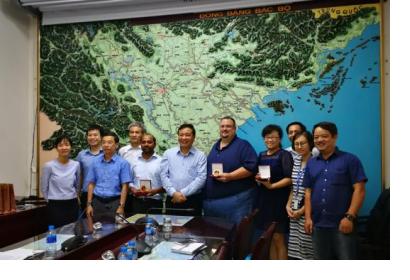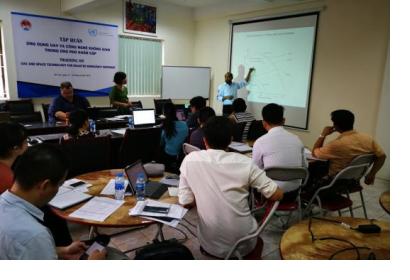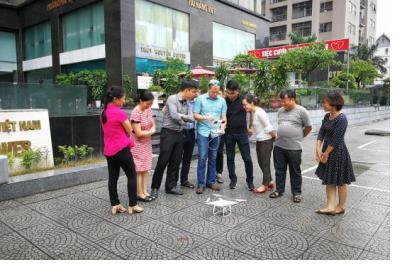UN-SPIDER is working with the Viet Nam Ministry of Agriculture and Rural Development (MARD), the Viet Nam Disaster Management Authority (VNDMA) and the Disaster Management Policy and Technology Center (DMPTC) to promote the use of space-based information in disaster management.
From 13 to 17 August 2018, a team of experts led by UN-SPIDER visited Viet Nam upon invitation from VNDMA and conducted multiple activities in Hanoi. The team was comprised of six experts from UN-SPIDER, Delta State University and the National Disaster Reduction Center of China (NDRCC). This visit followed up on the progress of the recommendations of the 2013 Technical Advisory Mission (TAM) and aimed at continuing the ongoing engagement with VNDMA and DMPTC, as well as assisting the stakeholders in implementing those recommendations.
The team had a series of meetings with officials of key stakeholder organizations invited by DMPTC and discussed Standard Operating Procedures (SOPs) - step-by-step generic guides for the utilization of Earth observation and geospatial information during emergency response in Viet Nam. The team also conducted an expert meeting with VNDMA to define long-term engagement of UN-SPIDER with Viet Nam, as well as long-term plans to support the implementation of the Sendai Framework for Disaster Risk Reduction (SFDRR). In addition to this, concrete actions in implementing National Spatial Data Infrastructure (NSDI) in Viet Nam and steps for DMPTC to become an Authorized User of the International Charter "Space and Major Disasters".
The expert team also conducted a hands-on training programme on “UAV and Space Technology for Disaster Management” for three days. The training addressed the use of Earth observation data obtained from space platforms and UAVs and also highlighted how microwave remote sensing can support assessing the impact of floods. Fifteen officials from different goverment agencies participated in the course.
During the same period, UN-SPIDER initiated an advanced activation of the International Charter on behalf of VNDMA to monitor the impact of the Typhoon Bebinca, which was expected to make landfall in Viet Nam on 17 August. The International Water Management Institute (IWMI) acted as the project manager for the activation. The Asian Disaster Preparedness Center (ADPC) provided mapping products to VNDMA and DMPTC. Both institutions are UN-SPIDER Regional Support Offices (RSO). This experience served as a live exercise during the training programme.
On the last day, the mission team and DMPTC had discussions on observations of the current issues of Viet Nam. Participants discussed future plans on matters such as NSDI, SOP, capacity-building plans and the strategic long-term engagement with UN-SPIDER.
UN-SPIDER activities in Viet Nam
UN-SPIDER first conducted a Technical Advisory Mission (TAM) to Viet Nam in 2013. As a follow-up, a series of national workshops and training programmes were also organized in the country: In 2014, the workshop and simulation exercise “Geospatially Enabling Community Collaboration” was conducted in partnership with the Geospatial Information and Technology Association (GITA). In 2015 and 2016, VNDMA officials visited the Mississippi Emergency Management Agency as a part of UN-SPIDER’s capacity building activity in collaboration with Delta State University. In 2016, UN-SPIDER team visited DMPTC to promote the implementation of a National Spatial Data Infrastructure (NSDI) and prepare an outline of the SOP for the utilization of space-based and geospatial information for disaster management and emergency response.



